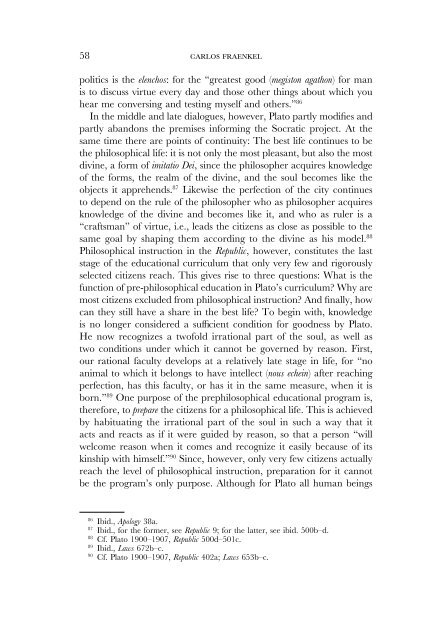Download PDF - Carlos F. Fraenkel
Download PDF - Carlos F. Fraenkel
Download PDF - Carlos F. Fraenkel
You also want an ePaper? Increase the reach of your titles
YUMPU automatically turns print PDFs into web optimized ePapers that Google loves.
58 carlos fraenkelpolitics is the elenchos: for the “greatest good (megiston agathon) for manis to discuss virtue every day and those other things about which youhear me conversing and testing myself and others.” 86In the middle and late dialogues, however, Plato partly modifies andpartly abandons the premises informing the Socratic project. At thesame time there are points of continuity: The best life continues to bethe philosophical life: it is not only the most pleasant, but also the mostdivine, a form of imitatio Dei, since the philosopher acquires knowledgeof the forms, the realm of the divine, and the soul becomes like theobjects it apprehends. 87 Likewise the perfection of the city continuesto depend on the rule of the philosopher who as philosopher acquiresknowledge of the divine and becomes like it, and who as ruler is a“craftsman” of virtue, i.e., leads the citizens as close as possible to thesame goal by shaping them according to the divine as his model. 88Philosophical instruction in the Republic, however, constitutes the laststage of the educational curriculum that only very few and rigorouslyselected citizens reach. This gives rise to three questions: What is thefunction of pre-philosophical education in Plato’s curriculum? Why aremost citizens excluded from philosophical instruction? And finally, howcan they still have a share in the best life? To begin with, knowledgeis no longer considered a sufficient condition for goodness by Plato.He now recognizes a twofold irrational part of the soul, as well astwo conditions under which it cannot be governed by reason. First,our rational faculty develops at a relatively late stage in life, for “noanimal to which it belongs to have intellect (nous echein) after reachingperfection, has this faculty, or has it in the same measure, when it isborn.” 89 One purpose of the prephilosophical educational program is,therefore, to prepare the citizens for a philosophical life. This is achievedby habituating the irrational part of the soul in such a way that itacts and reacts as if it were guided by reason, so that a person “willwelcome reason when it comes and recognize it easily because of itskinship with himself.” 90 Since, however, only very few citizens actuallyreach the level of philosophical instruction, preparation for it cannotbe the program’s only purpose. Although for Plato all human beings86Ibid., Apology 38a.87Ibid., for the former, see Republic 9; for the latter, see ibid. 500b–d.88Cf. Plato 1900–1907, Republic 500d–501c.89Ibid., Laws 672b–c.90Cf. Plato 1900–1907, Republic 402a; Laws 653b–c.



